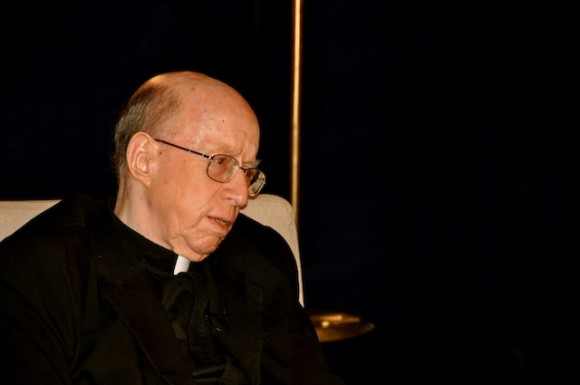
Vicar prefers socialism to ‘neoliberalism’
The Vicar General of the Roman Catholic Archdiocese of Havana, Monsignor Carlos Manuel de Céspedes y García-Menocal, has gone on record saying that he prefers “a more participative and democratic socialism” for Cuba, rather than the “neoliberalism” sought by some.
The prelate gave that opinion and made other significant statements during a lecture on Nov. 23 at the Félix Varela Cultural Center in Havana devoted to the legacy of the 19th-Century priest and independence leader for whom the Center is named. The lecture was published by the Archdiocese’s magazine “Lay Space.”
Some Cubans, De Céspedes said, “wish to improve the present socialist project, to make it more effective toward the attainment of the greatest possible well-being of all Cubans.”
Others “believe that any socialist project has been disqualified by recent history and, following that line of socio-political thinking, will actively seek a transition to a liberal society, with a neocapitalist slant.”
“It seems to me that both those roads can be consistent with a Varelian vision of man, of national society and international society, so long as they exclude, as Father Varela did, any form of annexationism,” De Céspedes went on, alluding to the concern of many that Cuba might be annexed or absorbed by the United States.
“Let us remember [Varela’s] literal expression in that regard: ‘Cuba must be as much of an island in terms of politics as it is in terms of geography,'” the prelate said. The concept may be Utopian, he said, “but, in any case, I share it. […] the latter road, neoliberalism, is not what I wish for House Cuba; rather, the former, a more participative and democratic socialism, to which apparently the current changes — in a slow process of realization — wish to lead us.”
“The current changes” is a reference to the ongoing actualization or updating of the social and economic guidelines set by the Cuban government. Some in the Church find it “a slow process.” (Read “Church Official Wants Faster Reforms” in Progreso Weekly, Nov. 26.)
To this end, the Catholic Church has a role as facilitator of dialogue between the government and the people, De Céspedes implies.
“We are summoned to dialogue, a form of brotherly love in a pluralistic society such as ours, in the face of any form of religious or social conflict,” he says. “The best contribution the Catholic Church can offer the Cuban nation is the exposition and testimony of the Catholic truth about God, man and the world in which man lives and develops.”
Many Cubans “experience a transitory impossibility to build a society in accordance to their vision of it,” the Vicar says, likely alluding to the dissidents. “They feel uncomfortable in the contemporary Cuban society, which is socialist in movement. They would like another type of socio-political and economic organization for it and for the moment don’t see a way to immediately realize their project. That leads them to social apathy or geographic distancing,” a euphemism for emigration.
If Varela were alive, De Céspedes says, perhaps addressing the dissidents, he would consider “doing something positive in the bosom of his Church and his people, along the lines of his project, within the real framework of today’s Cuban society and always in an attitude of dialogue that does not ignore ‘the others.'”
Varela would wonder “what he might sow, knowing that probably he might be unable to reap.” He would “make whatever good contributions are possible, with realism (which doesn’t mean sterile conformity) and simultaneously with a broad vision that’s all-encompassing and anointed with the hope for a better future.”
Elsewhere in his lecture, De Céspedes explores other areas of Cuban society with a critical eye. About the educational system, he says:
“In Cuba today, ‘general’ and humanistic formation is extremely poor. […] Among us, a young graduate from pre-university school, barely has an elementary knowledge of Spanish grammar, geography, foreign languages, history of Cuba and world history and literature. Knows nothing about classic languages, logic, philosophy, artistic appreciation (music, fine arts, etc.) and very little about civic and legal principles, etc.”
High-school youths “acquire an acceptable knowledge of exact sciences and technology,” but if they take up technical courses in college “they’ll not be fed any general culture or humanities. They become that tide of university-educated professionals […] who are incapable of reading a good book, have not learned to think properly with their own heads or know how to express themselves correctly, who have never seen a good concert or an opera or ballet, who are not interested in a play, cannot tell good cinema from bad, and cannot place a personage in his historical context, etc.”
Teachers are much to blame, De Céspedes says.
“Lamentably, we continue to have many teachers who are poorly trained about the subject they teach, who are simplistic and authoritarian repeaters and demand a passive attitude from the student.” Such educators “cannot arouse interest [in the student] or help develop their understanding. […] We should never overlook the student’s active participation in the classroom.”
Havana-born Monsignor De Céspedes, 77, holds doctorates in Law and Philology from the University of Havana and Theology from Gregorian University in Rome. He has been dean of the St. Charles and St. Ambrose Seminary in Havana and secretary of the Conference of Catholic Bishops of Cuba. At present, he is parish priest of the church of St. Augustine in Havana.

